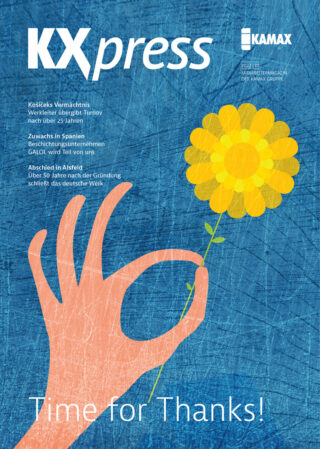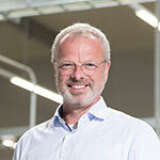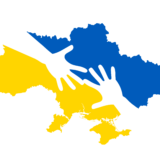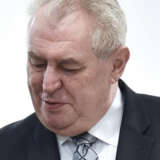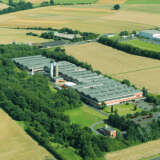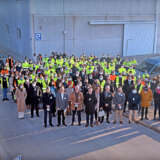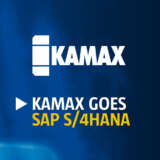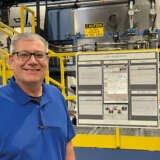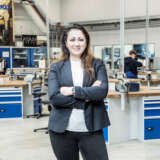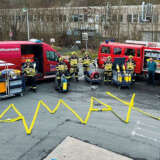5 questions to …
Chrisoula Angelidou, VP Global Human Resources
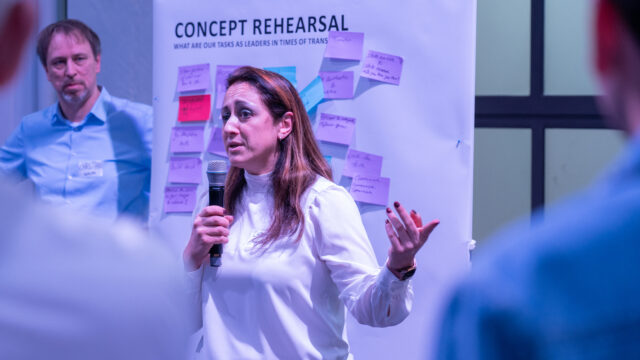
1. You have been with the company for a good six months now - what makes KAMAX special to you?
That's a great question to start with! It's the people, of course - I've met a lot of great people in the last few months. Regardless of whether they have only been with KAMAX for a short time, have been with KAMAX for 10 years or are about to retire. I was received with respect and with a lot of openness, and thats across all locations.
At the end of the day, people make the company - the passion with which they approach their tasks. When I'm out and about at the plant here in Homberg, I see a very high level of identification with KAMAX. I also see deep roots at our other long-standing locations. Turnov and Museros, for example, were built up over decades in a visionary manner. This perspective for the future can also be felt very strongly at our younger sites. There is a great deal of commitment beyond their own main areas of focus. That makes me feel very positive about being able to make a lot of progress here together! I have the feeling that I have arrived and feel comfortable in my role as a KAMAXIAN!
2. What are the three core skills we need as a company, as a team, to be future-proof?
Free space! Listening to the other person's opinion and accepting it. You don't always have to accept and love everything, but resourcefulness, cross-fertilization, learning from each other - that's something that would really do us good. This goes hand in hand with breaking down silo thinking! So many colleagues have a voice, opinions and ideas. They see and can name mistakes and they have solutions to them. We should take advantage of this - not everything has to go over the boss's desk. And only "nagging" does not help us!
Open and constructive criticism! Openly expressing criticism and not apologizing every time for having said something critical. It's not about who made the mistake, but what we learn from it. Mistakes do happen, especially when decisions are made quickly. But we'd rather make a mistake than plan everything down to the smallest fractional portion.
This requires trust! It's like at home: parents provide trust at home. We have to give our children trust so that they can grow. I think that's exactly how a company works. Trust starts from the top and goes across all management levels. Of course, you can define responsibilities by procedures, but at the end of the day, a lot of it comes down to the interpersonal level! How much time do I take before a conversation? What questions do I ask, do I show genuine interest in my counterpart? That's how you build trust, you take the time to have a good conversation. This is how you take responsibility and feel like an entrepreneur in the company...
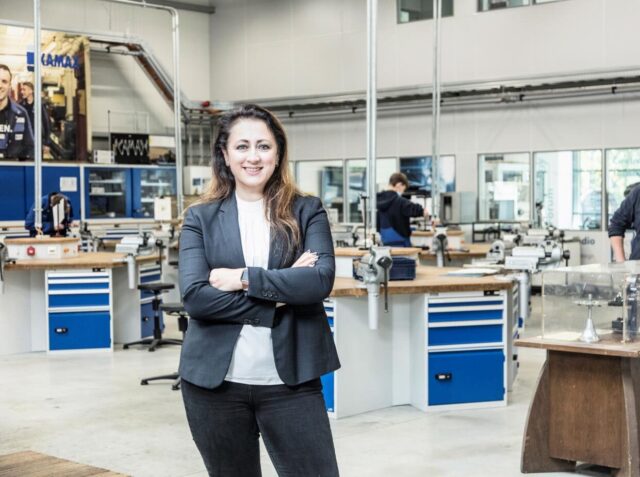
3. It all has a lot to do with corporate culture - how do you see KAMAX’s culture?
Culture has something to do with treating each other well. I think it's always important to be clear that not one department is responsible for culture. You can't force culture. It's again like home: a family culture is created through traditions, through symbols, through rituals, etc.
I am certainly also a bit of a cultural shock for my environment here. I am a working-class child, have an immigration background, I approach people very openly and consciously seek out every conversation. You don't always have to be liked, but a controversial and solution-oriented discussion is fun!
Culture grows like an onion from the inside out. This means that I have to start with my small team and everyone I want to reach somewhere within this onion forms a new layer. A lot of things in the organization seem to have died down a bit in the last few years, and together we want to reactivate that. Our onion has a few dents but with a little water and fertilizer, it will soon look great again.
4. Equality is among the issues that are close to your heart. How do we want to implement this in the company?
First, by allowing it! In our field, we are starting to hire more people who have very different backgrounds. This goes far beyond gender and ethnicity. Why not hire more people over 55? We need to make it easy for people with disabilities to be part of our company. This also includes making our working environment more flexible, so that people can work around a variety of issues.
At the same time, we have to raise awareness of why the issue is important in the first place. We have to approach this slowly. The easiest way to do this is to tackle cross-functional and cross-divisional projects. Give the teams more visibility. Talk about successes and celebrate them.
This also includes the compatibility of career and family. There is more to it than just parental leave; together with the German works councils we are currently working on a company agreement on mobile working. Career paths are also on the agenda this year, as is the concept for holistic occupational health management.
We want more women in the company, but we face the challenge that there are hardly any women in technical professions. We are already taking a much more active approach to universities. However, I think it would be difficult to impose a quota on a labor market that has been swept clean.
5. With all the diverse topics on your table - how do relax, where do you get your energy from?
My source of energy is called rest! I love being in the garden, pulling weeds for hours, crafting - whether painting walls or refurbishing garden furniture. And I'm a big fan of paint-by-numbers. I find it totally relaxing. Of course, it's important to be able to calm down: In the evenings and on weekends, my work phone just sits on the windowsill in the kitchen. Then we don't look at it at all!
KXpress
